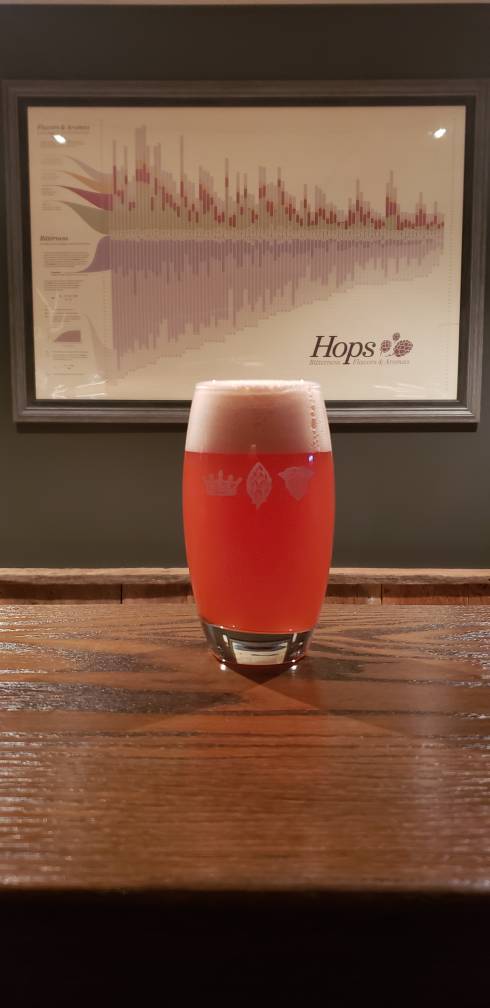- Recipe Type
- All Grain
- Yeast
- L-Planatarum Probiotic/Wyeast 1007 German Ale
- Batch Size (Gallons)
- 2.5
- Original Gravity
- 1.046
- Final Gravity
- 1.010
- Boiling Time (Minutes)
- 20
- IBU
- 5.5
- Color
- RED!
- Primary Fermentation (# of Days & Temp)
- 10
- Secondary Fermentation (# of Days & Temp)
- 14
- Tasting Notes
- Tastes like a melted fruit popsicle (hence the name)!
Recipe for 2.5 gal:
Grain bill:
2 lb (21.6%) German Pilsner
1.5 lb (16.2%) German Wheat
Hops:
.75 oz Hallertauer Hersbrucker @ 15 min (5.5 IBU)
Yeast:
1 capsule per gallon wort Swanson L-Plantarum Priobiotic (kettle sour)
Wyeast 1007 German Ale (primary fermentation)
Fruit/Adjuncts:
5 lbs (2lb per gal) frozen red raspberries
.75 lb Lactose (added at kegging)
Process:
Day 1:
Conduct a 60 min (BIAB) mash at 149F shooting for around 3 gal boil volume in kettle.
Chill wort to 90F, add lactic acid to lower PH to 4.5 and sprinkle in 1 L-Plantarum capsule per gallon (3 total). Purge kettle headspace with CO2 and seal lid with saran wrap to avoid oxygen exposure.
Day 2:
Allow wort to sour to your desired level (mine got down to 3.5 PH after about 30 hours). Bring wort to boil for 20 minutes total, adding hops in at 15 minute mark. Chill to 60F, rack to fermentation vessel, aerate, and direct pitch Wyeast 1007 German Ale.
Day 12:
Primary fermentation should be complete by day 10 shooting for a final gravity of 1.010.
In a double boiler, heat frozen raspberries (2lbs per gal) to 170F and hold for 10 minutes to pasteurize. Rack beer onto cooled raspberry puree in secondary. You can use a bad for the raspberries if you want but I just dumped them in commando.
Day 26:
Secondary fermentation should be complete at this point but you can let the beer condition as long as you like on the fruit.
Rack the beer to your keg (you may want to cold crash first) and add .75 lb of lactose (boiled with 1 cup water and chilled).
Carbonate to around 3.0 volumes and enjoy!
Grain bill:
2 lb (21.6%) German Pilsner
1.5 lb (16.2%) German Wheat
Hops:
.75 oz Hallertauer Hersbrucker @ 15 min (5.5 IBU)
Yeast:
1 capsule per gallon wort Swanson L-Plantarum Priobiotic (kettle sour)
Wyeast 1007 German Ale (primary fermentation)
Fruit/Adjuncts:
5 lbs (2lb per gal) frozen red raspberries
.75 lb Lactose (added at kegging)
Process:
Day 1:
Conduct a 60 min (BIAB) mash at 149F shooting for around 3 gal boil volume in kettle.
Chill wort to 90F, add lactic acid to lower PH to 4.5 and sprinkle in 1 L-Plantarum capsule per gallon (3 total). Purge kettle headspace with CO2 and seal lid with saran wrap to avoid oxygen exposure.
Day 2:
Allow wort to sour to your desired level (mine got down to 3.5 PH after about 30 hours). Bring wort to boil for 20 minutes total, adding hops in at 15 minute mark. Chill to 60F, rack to fermentation vessel, aerate, and direct pitch Wyeast 1007 German Ale.
Day 12:
Primary fermentation should be complete by day 10 shooting for a final gravity of 1.010.
In a double boiler, heat frozen raspberries (2lbs per gal) to 170F and hold for 10 minutes to pasteurize. Rack beer onto cooled raspberry puree in secondary. You can use a bad for the raspberries if you want but I just dumped them in commando.
Day 26:
Secondary fermentation should be complete at this point but you can let the beer condition as long as you like on the fruit.
Rack the beer to your keg (you may want to cold crash first) and add .75 lb of lactose (boiled with 1 cup water and chilled).
Carbonate to around 3.0 volumes and enjoy!























































![Craft A Brew - Safale S-04 Dry Yeast - Fermentis - English Ale Dry Yeast - For English and American Ales and Hard Apple Ciders - Ingredients for Home Brewing - Beer Making Supplies - [1 Pack]](https://m.media-amazon.com/images/I/41fVGNh6JfL._SL500_.jpg)



